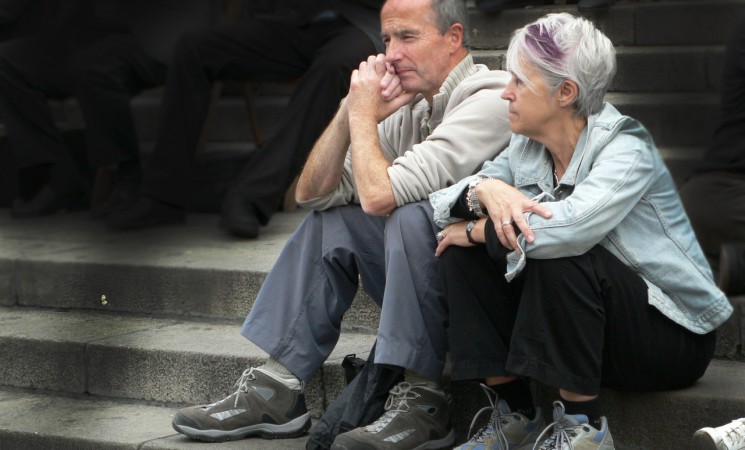Archived Content
This page is archived and provided for historical reference. The content is no longer being updated, and some of the information may have changed over time and could be outdated or inaccurate.

By Shannon T. Mejía, Ph.D.
Between January 2008 and February 2010, 8.8 million people lost their jobs, real personal income declined by 6 percent, and net household wealth fell by 15 percent. The Great Recession simultaneously shocked the employment, housing, and stock markets—the primary institutions that help individuals and families meet their current needs and plan for the future. Although the immediate impact of the Great Recession was most profound for young and unskilled workers, those in midlife—with concern for their selves, children, and parents—were affected in ways that reverberated throughout society.
Our research used data from the 2006 and 2010 waves of the nationally representative Health and Retirement Study (n = 3,850) to examine the implications of middle-aged adults’ (age = 51–60 years) responses to financial loss on their sense of control.
What were the implications of middle-aged adults’ responses to financial loss on their sense of control?
The Great Recession—with its unexpected shock to social institutions—provided unique insight on how individuals strive to exert control over their lives within the constraints of their social circumstances. In our study, a substantial proportional drop (greater than pre-recession annual fluctuation) in income and/or wealth between 2006 and 2010 measured exposure to the Great Recession. Individual actions included an increase or decrease in interdependence with others: giving help to others, receiving help from others, and increasing the complexity (number of people living in) of households. Social circumstances included pre-recession income and education level.
Across social circumstance, experiences of financial loss during the Great Recession resulted in increased interdependence and decreased sense of control. Social resources, however, shaped circumstances prior to the recession and how interdependence increased during the recession period.
Experiences of Financial Loss Were Broadly but Unequally Distributed
Over half of the respondents (55 percent) experienced relative stability in their income and wealth between 2006 and 2010. Loss in income (17 percent) and wealth (20 percent) were similar in their occurrence, and a small proportion of respondents (9 percent) experienced a substantial drop in both income and wealth. Women were more likely to lose income. Minorities and persons with functional limitations were more likely to experience all forms of financial loss.
Those with Fewer Social Resources Entered the Recession with More Interdependent Social Ties
Our findings illustrate how income and education conditions responses to unexpected financial loss. Those with fewer socioeconomic resources entered the recession with networks already taxed by complex households and receiving help from others—both of which further increased, across experiences of financial loss, during the Great Recession. Meanwhile, those with more socioeconomic resources gave more help to others and were therefore potentially able to strengthen their social networks.
Individuals Responded to Financial Loss by Engaging Their Social Network Resources
Household complexity and receiving help from others increased across all forms of financial loss. Giving help to others also increased, but less so among those who lost a substantial amount of wealth.
Minorities and persons with functional limitations were more likely to experience all forms of financial loss.
Education Protects Perceptions of Control in the Face of Financial Loss
The effect of financial loss on sense of control was dampened considerably by education.
Individuals with higher education have broader networks and access to a more diverse set of opportunities, which may have made the financial loss seem more like a challenge than an insurmountable obstacle.
Reliance on Others Can Increase Vulnerability and Helping Others May Be a Strategy to Prepare for Uncertain Times
Engaging social networks can strengthen or strain social ties. Interdependence expands boundaries of responsibility and can increases potential exposure to external assaults. Giving contributes to the well-being of others, and was found in our study to increase one’s sense of control. Helping others could be a strategy for maintaining a sense of control in the face of uncertainty.
Expect Greater Interdependence with Others in the Face of Uncertainty
This study explored the potential of middle-aged adults to adapt to unexpected financial loss through increasing their interdependence with others. We found interdependence with others to increase in response to financial loss, but at the cost of perceived control. As social environments become more uncertain, we can expect the engagement of interpersonal resources within networks to increase and planning to become more difficult. Special attention should be paid to how individuals and groups negotiate their lives and to the sacrifices they make in attending to their own needs and the needs of others, as these actions will contribute to their future experiences. The repercussions of the Great Recession will not be fully understood for decades, but the evidence from this study suggests that the lives of today’s middle-aged adults have been greatly affected by it.
Read the Article
Funding
This research was supported by a National Science Foundation Integrative Graduate Research and Education Traineeship (IGERT) Grant #DGE 0965820.
About the Author
 Shannon Mejía is a research fellow in the Psychosocial Aging Group and the Biosocial Methods Collaborative at the Institute for Social Research at the University of Michigan. She received her Ph.D. in human development and family studies at Oregon State University. Her research examines how older adults respond and adapt to changes in their environments. Dr. Mejía’s current projects examine couple’s shared experiences and beliefs and older adults’ experiences of health and well-being in their daily lives.
Shannon Mejía is a research fellow in the Psychosocial Aging Group and the Biosocial Methods Collaborative at the Institute for Social Research at the University of Michigan. She received her Ph.D. in human development and family studies at Oregon State University. Her research examines how older adults respond and adapt to changes in their environments. Dr. Mejía’s current projects examine couple’s shared experiences and beliefs and older adults’ experiences of health and well-being in their daily lives.
Freeimages.com/jose luis navarro








